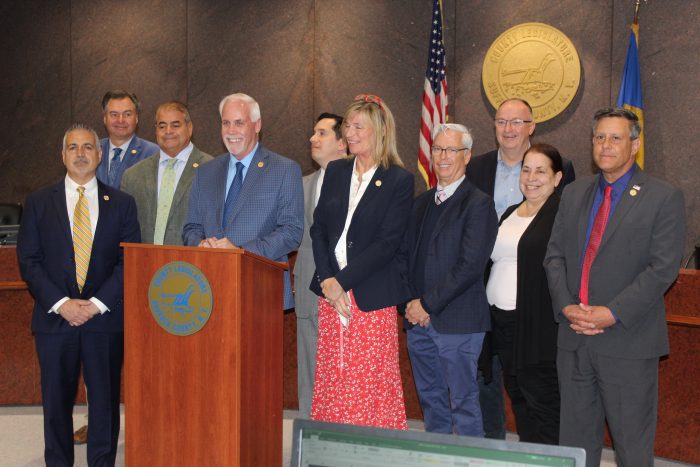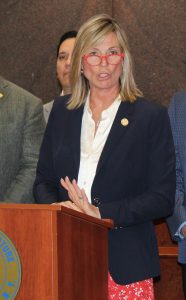Suffolk County legislators unveil legislation to reinforce term limits

County legislators met on the floor of the William H. Rogers Legislature Building in Hauppauge May 12 to announce legislation that would solidify term limits for elected officials in Suffolk County.
If passed, the proposed legislation would limit the offices of county executive, comptroller and legislators to a total of 12 years. Proponents argue the measure will remove a loophole in the law that allows individuals to exceed the 12-year threshold.
Term limits were first instituted in Suffolk County in 1993 by voter referendum. However, the statute was ambiguous, according to Legislator Stephanie Bontempi (R-Centerport).
“In 1993 Suffolk County voters went to the polls and approved term limits that dictate an elected official in the Legislature, the comptroller or the county executive could not serve in the same office [beyond] 12 consecutive years,” Bontempi said. “However, that still leaves the possibility for a candidate to run for that office again after a break in the 12 years.”
Bontempi’s proposed legislation would close this loophole. If enacted, the law would mandate that no person could serve more than 12 cumulative years in office.
Last year, former county Legislator Kate Browning (D-Shirley) campaigned in a special election for the 3rd Legislative District. Despite previously serving in the Legislature for 12 years, Browning received the Democratic nomination following an appellate court panel ruling. She was defeated in that race by current Legislator Jim Mazzarella (R-Moriches) by a 55-45% margin and again in November’s election by 63-37%.
Mazzarella said this legislation will prevent a similar scenario from unfolding in the future, cementing 12-year term limits in Suffolk for good.
“A year ago when I first ran for office, a former legislator who had already served 12 years tried to game the system and run again,” Mazzarella said. “I could tell by being out there with the voters that the electorate at the time felt duped. Ultimately, the voters did make their feelings known at the ballot box and I was elected as legislator.” He added, “This law needs to be put in place to guarantee that voters are properly represented.”

Bontempi said the purpose of the legislation is to bring fresh blood into the political process and to add more opportunities for newcomers in county government. “The goal here is for the majority to provide Suffolk County voters new candidates who can bring new ideas and new perspectives to their offices,” she said, adding, “Our communities are ever changing, and leadership should reflect those changes.”
Presiding Officer Kevin McCaffrey (R-Lindenhurst) said voters approved term limits in 1993 with an understanding that it would prevent elected officers from serving more than 12 years. He considers this new legislation a way to reinstate the law’s original intent.
“In 1993 the voters overwhelmingly approved and passed term-limit laws,” McCaffrey said. “Their intent, as was our intent, was to make it a 12-year term.” The presiding officer added, “We want to make sure that we codify it. We’re going to put it up as a referendum for the voters after this resolution is passed, and we expect them to overwhelmingly support this referendum.”
While this legislation will impose definitive term limits on several offices, there are some notable exemptions. The offices of county sheriff, county clerk and district attorney are each mandated by the state constitution and thereby cannot be regulated by county law, according to McCaffrey.
“Those are state-mandated offices and we do not have the ability to control them,” the presiding officer said.
A vote on Bontempi’s legislation is expected in early June. If the resolution is passed by the Legislature, voters will have final say on the matter in a referendum this November.






